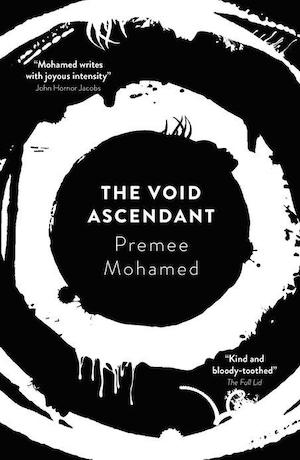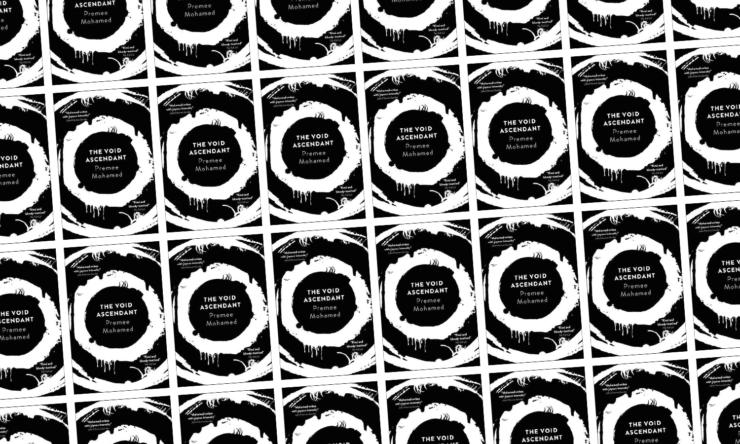It’s no small achievement to tell a compelling story across the three books of a trilogy. That’s challenge enough, but for a handful of writers, simply doing that isn’t quite enough. I can think of a handful of examples of this, which takes the already-difficult task of following a novel with a sequel done in a new genre and further complicates things. Jeff VanderMeer’s done it twice, with the Southern Reach and Ambergris trilogies.
And having read Premee Mohamed’s The Void Ascendant, I can confirm that she’s pulled it off as well with her Beneath the Rising trilogy.
I wouldn’t normally throw in a spoiler alert for an entire trilogy, but I’m going to do so here; I knew almost nothing about the first book, Beneath the Rising, going in, save that its plot involved advanced technology and sinister eldritch beings, and that was enough. But some of the most rewarding elements of the trilogy have to do with the reversals that Mohamed works into the plot, which are both breathtaking in their own right and do a fine job of deepening the themes that resonate throughout all three books.
So. Spoilers follow.
In book one, Beneath the Rising, Mohamed introduced readers to Nick Prasad, the longtime friend of Johnny Chambers, a young genius whose inventions have made life a far better place. I’ve compared the book to Nick Harkaway’s The Gone-Away World to a number of people, in part because of its madcap energy and genre-spanning narrative. But just as (spoilers) there’s a massive, gut-wrenching twist in Harkaway’s novel that upends the relationship between its two leads, so too is there one in Beneath the Rising. In this case, it has to do with Johnny — who turns out to be more Victor Von Doom than Reed Richards in terms of her ethical composition. And Nick, who’s initially seemed like the perennial sidekick, turns out to be the actual hero of the narrative, which takes the book to some impressively subversive places.
Buy the Book


The Void Ascendant
Taken on its own, Beneath the Rising is a thrilling work all its own. Book two, A Broken Darkness, complicates things further. The eldritch beings from book one have returned, and Nick and Johnny must reluctantly team up and travel the globe to deal with a threat to all existence. But the effects of Johnny’s betrayal of Nick’s trust have lingered, and the tension between them gives the book an entirely different kind of energy—still propulsive, but with a far more complex emotional dynamic. And at novel’s end, Mohamed ends things with a stunning flourish—with Johnny apparently dead, the Earth destroyed, and Nick sent into another dimension entirely.
And so, The Void Ascendant. If the previous two books were largely Earthbound, this one—in part by necessity—ventures into a host of alien realms. When the book opens, several years have passed, and Nick has become the Prophet in a royal court, where the rulers do so at the whims of the sinister Ancient Ones. The first scene includes Nick effectively bluffing his way through a series of prophecies and witnessing a public execution; he remains haunted by all he’s seen and done, wrestling with both survivor’s guilt and a continuing need to survive even longer, regardless of what it might require of him.
And then Nick and the Advisor, the closest thing he has to a friend in this terrifying royal court, visit a spy who’s been taken prisoner. The spy’s body appears to be a patchwork of a host of living beings:
“As it turned I saw the intermittent thick, chitinous scales on its back rippling like an unsettled dragon’s, as did the spikes along its backbone, a dorsal fin of semi-translucent insect shell. The skin along the shins was blotched with what I first took to be tattoos, but which squirmed as if black and green worms moved below the skin. Bright gray eyes, round and birdlike, peered out of two long scars on the calves, blinking. They had eyelashes.”
There’s more than a little horror in the DNA of this novel, and the trilogy as a whole—both of the body and cosmic varieties. But Mohamed’s description of the spy isn’t just a feat of imagination; the spy, who we’ll come to know as Yenu, may or may not be a resurrected Johnny, or a flawed doppelganger of Johnny, or something else entirely.
One of the subtler threads in The Void Ascendant is the way that Nick seems unclear of how he should regard Yenu, and what name he should use when referring to her. He’s adamant that she can’t be Johnny; for her part, she’s cagier about her origins and motivations. And because Nick has genuinely good reasons for never trusting her again, he’s torn. What do you do when someone capable of genuinely awful things tries to entice you on a quest that’s seemingly capital-g Good?
From its beginnings in the palace, Nick’s odyssey leads him across worlds, through a host of political intrigue, and into more than a little swashbuckling. (The genre-hopping here happens from book to book, but it also plays out within this particular narrative.) And throughout it, Nick and Yenu revisit older methods of bantering, including abundant pop culture nods. (The Void Ascendant includes references to both Mortal Kombat and David Cronenberg’s The Fly.) But even that isn’t just a case of pop culture references for the sake of them; there’s something a little heartbreaking about watching Nick and Yenu go through the motions of friendly banter even as the trust that once existed between them has fallen away completely.
Titles are funny things, and The Void Ascendant might well have the most inaccurate title imaginable. This is a maximalist narrative, with Mohamed throwing both knowing pop culture references and thematically-resonant explorations of trust, forgiveness, and justice into the mix. This is a book, and a trilogy, that can encompass entire genres in thoroughly unexpected ways. And it brings a memorable and accomplished trilogy to a close with aplomb.
The Void Ascendant is available from Rebellion Publishing.
 Tobias Carroll is the managing editor of Vol.1 Brooklyn. He is the author of the short story collection Transitory (Civil Coping Mechanisms) and the novel Reel (Rare Bird Books).
Tobias Carroll is the managing editor of Vol.1 Brooklyn. He is the author of the short story collection Transitory (Civil Coping Mechanisms) and the novel Reel (Rare Bird Books).










